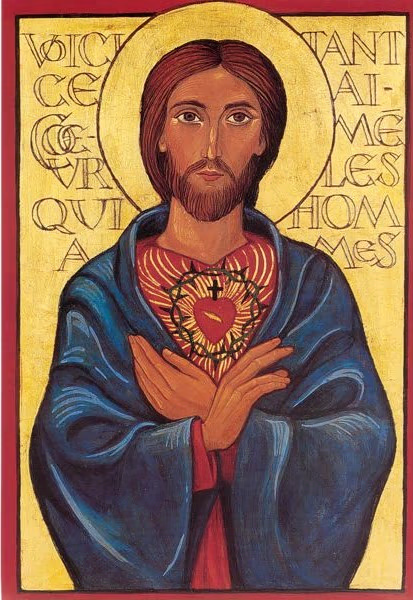Chapter Sermon
Fra' Francesco | Posted on |
Every first Friday of the month, the monks hold a day of retreat. After None, the Father Prior
usually gives a few words of edification. We thought that the chapter sermon of last July 4th might
also benefit the families of all our friends and benefactors.

My dear brothers, on this day of retreat, the first Friday of the month, I would not like to add heavy
words to the burden of the scorching heat, but, on the contrary, to encourage one another to give a
supernatural meaning to this trial, as to all sorrow. For this, we must look to the cross of Jesus,
who made his passion and death a praise of adoration to his Father and a means of making
righteous reparation for all the sins of the world. Jesus is the perfect model to follow in all things,
and especially in the sorrows of this life. Our poor nature, which Our Lord wanted to assume in
everything except sin, cries out with him: “Father, if it is possible, take away from me this endless
heat wave and these other fatigues and sufferings of body and soul.” Yes, Jesus suffered from the
even higher heat of Palestine, which is currently more or less ours, but, curiously on the Internet, I
saw that on September 4, 2020 the temperature in Jerusalem was 40°C. In short, let us encourage
ourselves to live for the Lord these sacrifices that Providence reserves for us. The secret to living
them well lies in the love shown by the Sacred Heart of Jesus. What is admirable, you see, and
unimaginable is that, on Calvary, the soldier did not just observe the death of Jesus but, O
sacrilege!, he pierced his right side to the heart with his lance. From this sacrilegious act that
assured death, if there was still any doubt, water and blood emerged, symbolizing an infinite love
provoked by the hatred of men. Jesus uses the most serious sin of men to pour out upon them the
waves of his mercy. This is the madness of God. A madness that the Church reiterates to us in the
Collect for the Feast of the Sacred Heart, for which we celebrated Mass this morning: “O God, in
the Heart of your Son, wounded by our sins, you have mercifully lavished infinite treasures of
charity.”
This extreme charity manifested in the passion and death of Jesus presents itself to us in a
particular way: gentleness, which is its highest expression.
What then is gentleness?
“It is a virtue which, in its broadest sense, refers to a moral quality manifested by kindness,
benevolence, patience, and an absence of harshness in behavior and speech. It implies an ability
to act calmly and without aggression, even in the face of difficult situations. Gentleness is often
associated with humility, compassion, and the ability to understand and forgive.” Gentleness does
not mean weakness but self-control, self-control of one's passions. It is the opposite of all
roughness, harshness, acidity, bitterness, brutality, and aggressiveness. Its image is the dove, or
better still, the innocent lamb, which, in Jesus, attains such a divine degree that through it the sin of
the world is repaired.
“Learn from me, for I am gentle and humble of heart.” Jesus thus shows us that there is no
meekness without humility, and that the path to meekness is humility. Glory is reserved only for the
meek and humble, as Saint John affirms in the Book of Revelation. “The Lamb who was slain
alone is worthy to receive praise, honor, glory, and power forever and ever.”
I remind you of our New Year's resolution: fraternal charity. Let us therefore rekindle the grace that
the Lord has offered us through his representative. In all our written and oral relationships, whether
in the choir, at the altar, in the sacristy, in the refectory, while washing dishes, or at work, may all
our interactions be bathed in the meekness and humility of Jesus. In this, we also have another
model in the Virgin Mary: O Clemens, O Pia! O Dulcis, Virgo Maria, pray for us now and all the
days of our lives so that, having become meek, we may receive through you the promised
beatitude: the possession of this new earth which is heaven.
